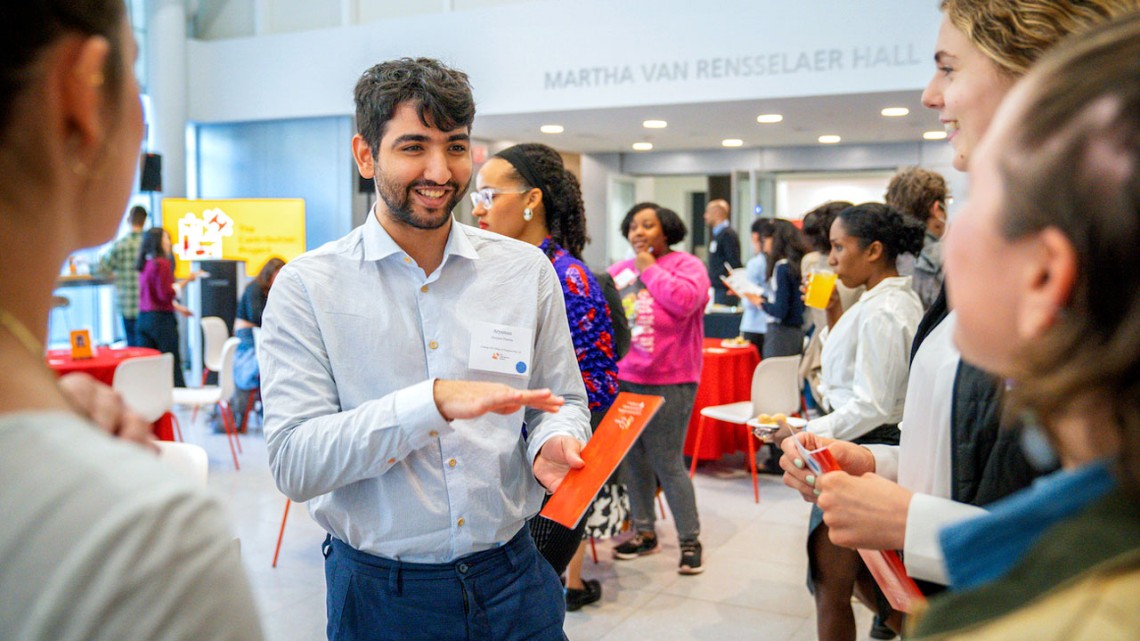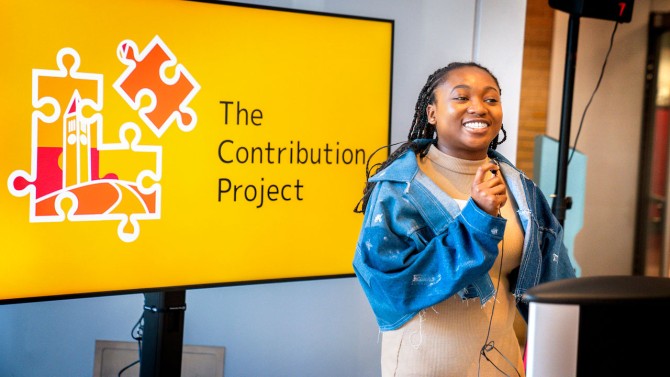
College of Engineering student Aryaman Anupam Thareja ’25 chats with other contributors and guests attending the 2023 Contribution Project Student Showcase in the Human Ecology Commons.
The Contribution Project returns to Cornell, expands to two SUNYs
By Juan Vazquez-Leddon
The Contribution Project, a program that grants $400 each to undergraduates with ideas for how to make a difference in the world, is expanding from Cornell to Binghamton and Stony Brook universities.
Students can apply through Feb. 19 on the Contribution Project website.
“It is exciting to invite other universities to be a part of this project that we know Cornell students have enthusiastically engaged with and enjoyed,” said Anthony Burrow, director of the Bronfenbrenner Center for Translational Research, which is the home of the Contribution Project, and the Ferris Family Associate Professor of Life Course Studies in the College of Human Ecology.
In 2019, Burrow received the Engaged Scholar Prize from what is now the Einhorn Center for Community Engagement, and used the prize’s monetary award to launch the Contribution Project – 50 contributions each received $400. The contributions were randomly selected from students who described the contribution they’d like to make and how $400 would help them do it.
For the past two years, using the same application and random selection process, 100 contributions received $400, thanks to support from HopeLab, a California-based private social innovation lab supporting research and services promoting youth success. This year, the project will select 200 contributors from across the three campuses.
Some of the previous contributions from Cornell students focused on the Ithaca area. For example, Arshia Agrawal ’26 from the College of Arts and Sciences (A&S) chose to support Moms PLUS+, a local nonprofit that helps mothers overcome childhood traumas and abuse to become better mothers. College of Human Ecology student Grace Nahmiyas ’25 volunteers with a group of kindergartners at the Greater Ithaca Activities Center and decided to use the funding to support the center.
Other contributions have benefited communities across the state. Amelia Sidonio ’24, from the College of Agriculture and Life Sciences (CALS), provided winter clothing to children in need from rural areas in western New York, while another CALS student, Sammi Lin ’24, got started developing a virtual reality platform with Cornell Cooperative Extension Harvest New York to better understand and support the needs of New York City urban farmers.
Some contributions had far-reaching impact. Aryaman Anupam Thareja ’25, from Cornell Engineering, founded Solar-is, an organization that builds solar panels that power fans to keep schools in New Delhi, India, cool. He used the funds to help maintain those panels. And Karl Lam ’24, from the Nolan School of Hotel Administration in the Cornell SC Johnson College of Business, chose to support the Refugee Union, a grassroots organization in Hong Kong that helps refugees learn child care skills and create community.
Burrow said the Contribution Project has been looking to expand and found willing partners in Binghamton University’s Center for Civic Engagement and Stony Brook University.
“Stony Brook University is thrilled to join forces with Cornell University and Binghamton University for the Contribution Project,” said Urszula Zalewski, director of experiential education at Stony Brook University’s Career Center. “This initiative aims to harness the innovative and impactful ideas of Stony Brook University students, channeling their creativity and unique skills toward community-oriented projects.”
“Binghamton University’s Center for Civic Engagement has a mission to cultivate partnerships that strengthen communities and develop active and engaged citizens,” said Sara Hall, the center’s senior assistant director. “This new partnership with the Contribution Project and Cornell University provides our students with resources to bring their ideas to life. We look forward to seeing how our students engage with the larger Binghamton area.”
The project’s expansion also provides an opportunity to learn about its impact. This year, all applicants will participate in a formal research study; Burrow, who directs the Purpose and Identity Processes Lab, will gather insight on how and why contributions are chosen.
“Doing this several times, we’ve seen the results of what they choose to contribute, but not the why,” said Burrow. “We want to have a deeper understanding of how students are thinking and feeling about themselves and others when they ultimately select their contribution.”
The contributions don’t just positively affect the recipients; it’s a two-way relationship, Burrow said.
“It is our sense that for students, contributing in the ways they desire helps fuel their personal growth, well-being and purpose,” he said. “Supporting their efforts helps them innovate and create positive change. Its benefits spread widely.”
Juan Vazquez-Leddon is the communications director for the Bronfenbrenner Center for Translational Research.
Media Contact
Get Cornell news delivered right to your inbox.
Subscribe

